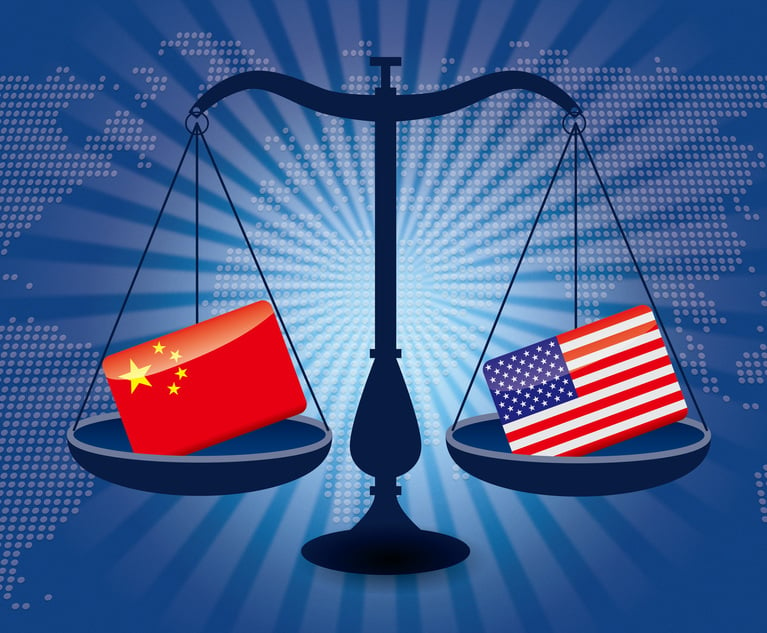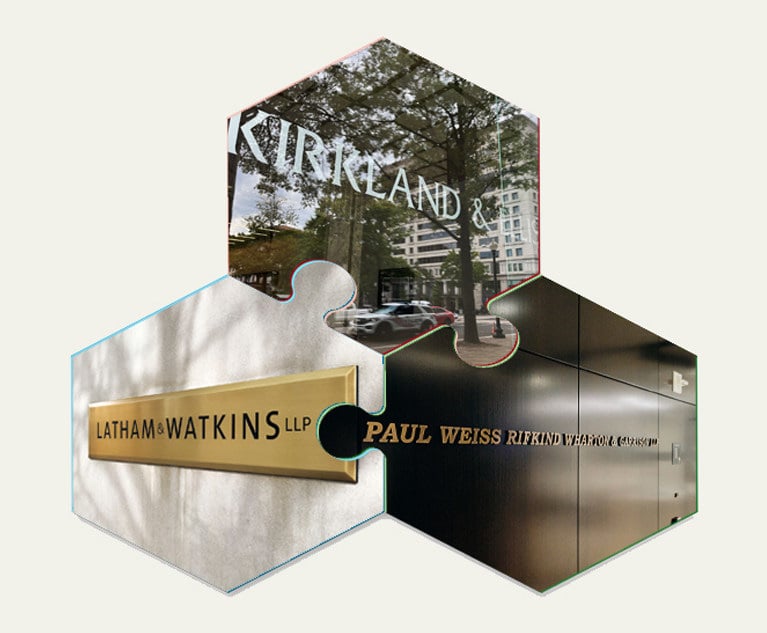What Makes Lawyers Happy? Money, Honey
It seems the more money lawyers make, the happier they are and the less they care about what normal folks call quality-of-life issues, a new study finds.
January 31, 2019 at 05:12 PM
4 minute read

Why all the hand-wringing about the low morale of lawyers?
It turns out lawyers aren't so miserable, particularly if they're sitting pretty as equity partners raking in the dough.
Partners are a surprisingly content lot, according to Major Lindsey & Africa's partner compensation survey: Among respondents, 78 percent classified themselves as very satisfied, moderately satisfied or slightly satisfied when their compensation is taken into consideration. Only 15 percent put themselves in the dissatisfied category, and 7 percent were neutral. (What's with the neutral thing? Are they numb?)
And you know all that talk about how lawyers are overworked and depressed and how they would gladly sacrifice their worldly riches for more freedom? Hah! Fewer of them are expressing that longing: Only 50 percent say they'd trade money for other benefits such as more time off, greater flexibility or cut in billable hours—a 12 percent drop since 2016.
I hate to say lawyers are driven by filthy lucre, but you have to wonder. It seems the more they're making, the happier they are and the less they care about what normal folks call quality-of-life issues. (Yes, I do recognize the contingent of lawyers who struggle with mental health and substance abuse problems made worse by Big Law demands.)
But as for what the MLA study shows, here's the takeaway:
- Lawyers making the most money ($1.5 million+) show the highest satisfaction (46 percent are very satisfied, and 40 percent moderately to slightly satisfied), while those making the least (under $300,000) are the most glum (45 percent dissatisfaction rate).
- Lawyers with the highest billable hours (2,401+ hours) showed the highest satisfaction rate (35 percent in the very satisfied group).
- Lawyers with more seniority—who presumably earned more—were less inclined to trade compensation for nonmonetary benefits (53 percent in the 20+ years group had no desire to forfeit money for other things).
- A majority of equity partners (52 percent) were unwilling to trade compensation for nonmonetary benefits.
- Among major cities, New York had the highest percentage of partners (61 percent) who would not make the trade-off.
 That lawyers making lots of moolah are happier is a no-brainer, but what's crazy is that those billing insane hours (more than 2,400!) tend to be the most satisfied. And why would the legal sweatshop capital of the world—New York—boast the highest percentage of partners who wouldn't trade money for a more sane lifestyle?
That lawyers making lots of moolah are happier is a no-brainer, but what's crazy is that those billing insane hours (more than 2,400!) tend to be the most satisfied. And why would the legal sweatshop capital of the world—New York—boast the highest percentage of partners who wouldn't trade money for a more sane lifestyle?
Jeff Lowe, the author of the study, says he was surprised by the results, too. “I would have thought that the higher-paid partners would want to make the trade-off because they've attain success and can afford to.” I know I'm oversimplifying, but this study does make me think money is addictive, and that the more you have, the more you want.
But Lowe thinks I'm being way too cynical. “I think they really like what they do.” He adds that the overall rate of satisfaction, both factoring in compensation and taking it out, is not that far apart—78 percent versus 70 percent, respectively. “It's largely positive news,” Lowe sums up.
So here's the recap: Lawyers who've attained partnership are largely content, but the most content among them are ones who make big bucks and put in insane hours.
In my book, that makes them both weird and greedy.
Contact Vivia Chen at [email protected]. On Twitter: @lawcareerist.
This content has been archived. It is available through our partners, LexisNexis® and Bloomberg Law.
To view this content, please continue to their sites.
Not a Lexis Subscriber?
Subscribe Now
Not a Bloomberg Law Subscriber?
Subscribe Now
NOT FOR REPRINT
© 2025 ALM Global, LLC, All Rights Reserved. Request academic re-use from www.copyright.com. All other uses, submit a request to [email protected]. For more information visit Asset & Logo Licensing.
You Might Like
View All

Letter from Asia: As American Firms Retreat, Will Loyal UK Firms Regain Market Share In Asia?


Change Is Coming With the New Trump Era. For Big Law, Change Is Already Here
6 minute readTrending Stories
- 1Parties’ Reservation of Rights Defeats Attempt to Enforce Settlement in Principle
- 2ACC CLO Survey Waves Warning Flags for Boards
- 3States Accuse Trump of Thwarting Court's Funding Restoration Order
- 4Microsoft Becomes Latest Tech Company to Face Claims of Stealing Marketing Commissions From Influencers
- 5Coral Gables Attorney Busted for Stalking Lawyer
Who Got The Work
J. Brugh Lower of Gibbons has entered an appearance for industrial equipment supplier Devco Corporation in a pending trademark infringement lawsuit. The suit, accusing the defendant of selling knock-off Graco products, was filed Dec. 18 in New Jersey District Court by Rivkin Radler on behalf of Graco Inc. and Graco Minnesota. The case, assigned to U.S. District Judge Zahid N. Quraishi, is 3:24-cv-11294, Graco Inc. et al v. Devco Corporation.
Who Got The Work
Rebecca Maller-Stein and Kent A. Yalowitz of Arnold & Porter Kaye Scholer have entered their appearances for Hanaco Venture Capital and its executives, Lior Prosor and David Frankel, in a pending securities lawsuit. The action, filed on Dec. 24 in New York Southern District Court by Zell, Aron & Co. on behalf of Goldeneye Advisors, accuses the defendants of negligently and fraudulently managing the plaintiff's $1 million investment. The case, assigned to U.S. District Judge Vernon S. Broderick, is 1:24-cv-09918, Goldeneye Advisors, LLC v. Hanaco Venture Capital, Ltd. et al.
Who Got The Work
Attorneys from A&O Shearman has stepped in as defense counsel for Toronto-Dominion Bank and other defendants in a pending securities class action. The suit, filed Dec. 11 in New York Southern District Court by Bleichmar Fonti & Auld, accuses the defendants of concealing the bank's 'pervasive' deficiencies in regards to its compliance with the Bank Secrecy Act and the quality of its anti-money laundering controls. The case, assigned to U.S. District Judge Arun Subramanian, is 1:24-cv-09445, Gonzalez v. The Toronto-Dominion Bank et al.
Who Got The Work
Crown Castle International, a Pennsylvania company providing shared communications infrastructure, has turned to Luke D. Wolf of Gordon Rees Scully Mansukhani to fend off a pending breach-of-contract lawsuit. The court action, filed Nov. 25 in Michigan Eastern District Court by Hooper Hathaway PC on behalf of The Town Residences LLC, accuses Crown Castle of failing to transfer approximately $30,000 in utility payments from T-Mobile in breach of a roof-top lease and assignment agreement. The case, assigned to U.S. District Judge Susan K. Declercq, is 2:24-cv-13131, The Town Residences LLC v. T-Mobile US, Inc. et al.
Who Got The Work
Wilfred P. Coronato and Daniel M. Schwartz of McCarter & English have stepped in as defense counsel to Electrolux Home Products Inc. in a pending product liability lawsuit. The court action, filed Nov. 26 in New York Eastern District Court by Poulos Lopiccolo PC and Nagel Rice LLP on behalf of David Stern, alleges that the defendant's refrigerators’ drawers and shelving repeatedly break and fall apart within months after purchase. The case, assigned to U.S. District Judge Joan M. Azrack, is 2:24-cv-08204, Stern v. Electrolux Home Products, Inc.
Featured Firms
Law Offices of Gary Martin Hays & Associates, P.C.
(470) 294-1674
Law Offices of Mark E. Salomone
(857) 444-6468
Smith & Hassler
(713) 739-1250










